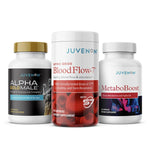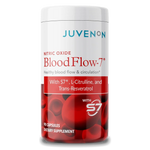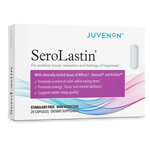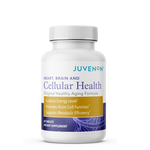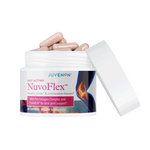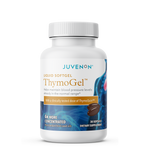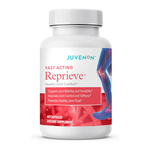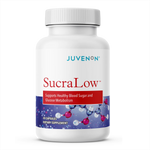
Finding yourself forgetting things more often as you age? While forgetful moments happen to everyone, you may be concerned if you find that they’re getting more frequent as you get older.
Some degree of cognitive decline is a normal part of aging, but there are ways that you can be proactive and turn the clock on this slow decline in cognitive function to keep your brain sharp and vibrant.
So, how exactly can we keep our minds young, our memories sharp, and our wits quick? The answer lies within your cells. Cognitive decline can often result from a decrease in brain cell production, alongside a decrease in the quality of new brain cells.
If you can keep your brain and nervous system cells as healthy as possible, then optimal mental sharpness is likely to follow.
Here are 5 key ways to keep your cells and your brain healthy for optimal cognition and vibrancy (and no more forgetting why you walked into a room!).
In this article you’ll learn:
- Four steps to keeping your mind sharp at any age,
- And why Juvenon’s Cellular Health formula may be a good addition to your healthy, brain-boosting lifestyle.
1. Stay active
Physical activity plays a huge role in neuroprotection, or the prevention of premature brain cell death and dysfunction. This is one of many reasons why it’s so important to stay active and engage in plenty of exercise even as you age.
During aging, the brain tends to shrink—leading to neurodegeneration that can affect your memory, focus, cognition, and mood. However, researchers have found that regular cardio exercise helps to maintain or even increase your brain volume—preventing age-related brain degradation of your brain tissues. [1]
Another study found that, when older adults who were sedentary but otherwise healthy began exercising, they experienced huge gains in cognition—especially as it relates to executive function. Executive function includes high level decision making, task performance, and critical thinking. [2]
A large study on healthy adults also noted that exercise could help reduce stress levels and improve mood as well. [3]
So, how exactly does exercise have all these benefits for your brain? Researchers have found that exercise improves blood flow to the brain and promotes neurogenesis, or the formation of healthy new brain cells and tissues. [4]
You should aim for at least 150 minutes of moderate-intensity cardio exercise each week, along with two 30 – minute full-body resistance sessions to promote muscle maintenance. However, any amount of exercise is better than inactivity. [5]
2. Eat a nutritious diet
Your diet provides the raw materials that your body needs to create healthy new cells—so it’s a key part of nourishing your brain cells and optimizing your cognitive health.
Thankfully, the best diet for your brain is good for the rest of your body, too. It includes focusing on whole, unprocessed foods, lots of fruits and vegetables, healthy proteins, and limited added sugars.
According to one review of studies, ultra processed foods—which are everywhere in our society—can severely damage your gut microbiota, or the healthy bacteria that live in your digestive tract. These bacteria play a key role in brain function via the gut-brain axis, and damage to this delicate ecosystem inside of your digestive tract may lead to declines in cognitive function. [6]
For this reason, it’s important to limit highly-processed foods—like frozen meals, fast food, boxed meals, and boxed snacks—to occasional treats.
Likewise, added sugar has similar effects on gut health—after all, most foods that are high in added sugar tend to be highly processed. One study has even found that a diet high in added sugar is associated with less creative thinking in children. [7]
On the other hand, whole and unprocessed foods are extremely nourishing for your brain. Fruits and vegetables are rich in vitamins, minerals, and antioxidants that help promote healthy cell growth and turnover, and the protein in eggs, unprocessed meats, nuts, seeds, and legumes helps to provide the amino acids needed to support cell formation. Healthy fats found naturally in these protein foods are also key for brain function—particularly omega-3 fats found in foods like salmon and flax seeds. [8]
Additionally, the fiber found in fruits, vegetables, and whole grains helps regulate digestive health, which can restore a healthy gut microbiota and help optimize brain function through the gut-brain axis. [9]
3. Have fun

Laughter really might be the best medicine!
Your vagus nerve is a central nerve that controls your body’s “fight or flight” response. In today’s world of COVID-19, hectic jobs, and packed schedules, it’s not uncommon for people to be in a continual state of fight or flight—meaning they are always in a stress response.
It can be hard for the vagus nerve to “switch off” this stress response sometimes, especially after your body has gotten used to it. Improving your vagal tone—or the responsiveness of your vagal nerve—is how to get out of this stress cycle. And surprisingly, having fun is one of the big things that can help your body return to a calmer, more relaxed state that allows for optimal health and clearer thinking. [10]
There’s a strong association between positive social connections (relationships) and physical health, so be sure to foster your relationships with loved ones, friends, grandchildren, and neighbors. [11]
Spending time outdoors is also associated with a decrease in worry and a better mood. Try to spend some time outdoors each day. As a bonus, the sun exposure helps your body to create more vitamin D—which may also help improve your brain function and mood. [12, 13]
And yes, researchers have conducted numerous studies on the health benefits of laughter. Laughing reduces your body’s production of stress hormones like cortisol and epinephrine, secretes endorphins that can elevate your mood, and help regulate the “happy hormones” serotonin and dopamine. [14]
In addition, researchers believe that the purpose of play and fun is actually to help us learn—so it likely improves your cognitive function and decision-making. So—have fun, pursue hobbies, spend time outside, and enjoy time with your loved ones—it’s good for you! [15]
4. Supplement smartly
Finally, you may want to consider adding some targeted supplements to help promote cognitive health, especially if your diet, exercise, or stress levels aren’t optimal.
Juvenon’s Cellular Health formula is a blend of powerful, natural ingredients that keep your cells healthy—and that includes your brain cells. Here’s what you’ll find in each dose:
Acetyl l-carnitine
Acetyl l-carnitine is a widely available, natural form of the compound carnitine. While carnitine isn’t an essential vitamin, it’s found in nearly every cell in your body because it plays such a key role in energy production within the mitochondria (the “power plant of the cell”). [16]
Research indicates that carnitine levels in the body decrease as you age, meaning that your mitochondria may be functioning less effectively as you get older—leading to ineffective cells, fatigue, and brain fog.
Specifically in regards to brain health, acetyl l-carnitine is neuroprotective—meaning it protects existing brain tissue from oxidative damage while stimulating new brain growth and exerting positive effects on mood and discomfort, both of which are regulated by the brain and nervous system. [17]
For these reasons, it’s a key ingredient in our powerful Cellular Health formula. Carnitine is also present in large amounts in animal foods.
Alpha-lipoic acid
Alpha-lipoic acid is a chemical that’s found naturally in your mitochondria. Like carnitine, it plays a key role in helping your body transform raw material from the food you eat into usable energy.
As a supplement, it can both improve mitochondrial function and protect your cells against damage from unstable free radical compounds. [18]
It also possesses neuroprotective properties. Studies have shown that it helps increase production of the neurotransmitter acetylcholine, and supplementation has been shown to help improve cognitive function. [19]
Biotin
Biotin is an essential vitamin that helps your cells better harness energy from foods, keeping them healthy and functioning optimally. [20]
For proper cell function, it’s also important to supplement with biotin when taking alpha-lipoic acid, as well. That’s why biotin is part of the Cellular Health formula. As an added bonus, biotin is a key ingredient in many hair, skin, and nails formulas—and you may see improvements in those when taking Cellular Health as well!
Foods that are rich in biotin include salmon, eggs, sunflower seeds, sweet potatoes, tuna, spinach, and almonds.
Takeaway
Minor declines in brain function during aging is normal, but inactivity, a poor diet, and stress can cause a more rapid decline in cognitive function.
Fortunately, there are several ways that you can take control of your brain function by making lifestyle choices that promote healthy cell growth and turnover.
Aim for plenty of exercise or other physical activity, which helps improve blood flow to the brain, promote cell growth, and increase brain volume.
Try to limit your consumption of highly processed foods or foods that are high in added sugar, as these foods may lead to poor gut health and cognitive problems via the gut-brain axis. On the other hand, be sure to fill your plate with lots of antioxidant-rich fruits and veggies, fiber-rich whole grains, and protein and healthy fats from unprocessed meats, nuts, seeds, and legumes.
You should also strive to have plenty of fun and foster meaningful relationships in your life to help keep your stress levels low.
Finally, consider adding Juvenon Cellular Health to your daily routine. Its ingredients make it a powerhouse formula for optimal cell formation, mitochondrial function, and brain health.
References
- Firth J, Stubbs B, Vancampfort D, et al. Effect of aerobic exercise on hippocampal volume in humans: A systematic review and meta-analysis. Neuroimage.2018;166:230-238. doi:10.1016/j.neuroimage.2017.11.007
- Colcombe S, Kramer AF. Fitness effects on the cognitive function of older adults: a meta-analytic study.Psychol Sci.2003;14(2):125-130. doi:10.1111/1467-9280.t01-1-01430
- Rebar AL, Stanton R, Geard D, Short C, Duncan MJ, Vandelanotte C. A meta-meta-analysis of the effect of physical activity on depression and anxiety in non-clinical adult populations.Health Psychol Rev. 2015;9(3):366-378. doi:10.1080/17437199.2015.1022901
- Cass SP. Alzheimer's Disease and Exercise: A Literature Review.Curr Sports Med Rep.2017;16(1):19-22. doi:10.1249/JSR.0000000000000332
- Department of Health and Human Services. Physical activity guidelines for Americans, 2nd edition. Health.gov website. 2018. Accessed August 2021. https://health.gov/sites/default/files/2019-09/Physical_Activity_Guidelines_2nd_edition.pdf
- Martínez Leo EE, Segura Campos MR. Effect of ultra-processed diet on gut microbiota and thus its role in neurodegenerative diseases.Nutrition.2020;71:110609. doi:10.1016/j.nut.2019.110609
- Hassevoort KM, Lin AS, Khan NA, Hillman CH, Cohen NJ. Added sugar and dietary fiber consumption are associated with creativity in preadolescent children.Nutr Neurosci.2020;23(10):791-802. doi:10.1080/1028415X.2018.1558003
- Martínez García RM, Jiménez Ortega AI, López Sobaler AM, Ortega RM. Estrategias nutricionales que mejoran la función cognitiva [Nutrition strategies that improve cognitive function].Nutr Hosp. 2018;35(Spec No6):16-19. Published 2018 Sep 7. doi:10.20960/nh.2281
- Liu X, Cao S, Zhang X. Modulation of Gut Microbiota-Brain Axis by Probiotics, Prebiotics, and Diet.J Agric Food Chem.2015;63(36):7885-7895. doi:10.1021/acs.jafc.5b02404
- Bonaz B, Sinniger V, Pellissier S. Vagal tone: effects on sensitivity, motility, and inflammation. Neurogastroenterol Motil. 2016;28(4):455-462. doi:10.1111/nmo.12817
- Kok BE, Coffey KA, Cohn MA, et al. How positive emotions build physical health: perceived positive social connections account for the upward spiral between positive emotions and vagal tone [published correction appears inPsychol Sci. 2016 Jun;27(6):931].Psychol Sci.2013;24(7):1123-1132. doi:10.1177/0956797612470827
- Triguero-Mas M, Donaire-Gonzalez D, Seto E, et al. Natural outdoor environments and mental health: Stress as a possible mechanism.Environ Res.2017;159:629-638. doi:10.1016/j.envres.2017.08.048
- Mayne PE, Burne THJ. Vitamin D in Synaptic Plasticity, Cognitive Function, and Neuropsychiatric Illness.Trends Neurosci.2019;42(4):293-306. doi:10.1016/j.tins.2019.01.003
- Yim J. Therapeutic Benefits of Laughter in Mental Health: A Theoretical Review.Tohoku J Exp Med.2016;239(3):243-249. doi:10.1620/tjem.239.243
- North G. The biology of fun and the fun of biology.Curr Biol.2015;25(1):R1-R2. doi:10.1016/j.cub.2014.09.006
- National Institutes of Health. Carnitine fact sheet for health professionals. Office of Dietary Supplements website. March 29, 2021. Accessed August 2021. https://ods.od.nih.gov/factsheets/Carnitine-HealthProfessional/
- Traina G. The neurobiology of acetyl-L-carnitine. Front Biosci (Landmark Ed).2016;21:1314-1329. Published 2016 Jun 1. doi:10.2741/4459
- National Institutes of Health. Dietary supplements for primary mitochondrial disorders. Office of Dietary Supplements website. June 3, 2020. Accessed August 2021. https://ods.od.nih.gov/factsheets/PrimaryMitochondrialDisorders-HealthProfessional/
- Tóth F, Cseh EK, Vécsei L. Natural Molecules and Neuroprotection: Kynurenic Acid, Pantethine and α-Lipoic Acid. Int J Mol Sci.2021;22(1):403. Published 2021 Jan 2. doi:10.3390/ijms22010403
- National Institutes of Health. Biotin fact sheet for health professionals. Office of Dietary Supplements website. March 29, 2021. Accessed August 2021. https://ods.od.nih.gov/factsh

